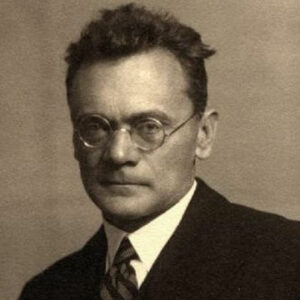Karl von Frisch was an Austrian ethologist who shared the Nobel Prize in Physiology or Medicine in 1973 with two other co-recipients. He was well-known for his research on the sensory perceptions of honey bees, and he was the first to provide an exact theoretical analysis of the significance of the bees’ waggle dance. Anton von Frisch was the son of a distinguished surgeon and urologist, and he decided as a child to follow in his father’s footsteps. He studied medicine in Vienna for a time under Hans Leo Przibram and Richard Hertwig before deciding that natural sciences were his actual passion. As a result, he turned to zoology and got his PhD from the University of Vienna in 1910, after which he was hired as an assistant to Richard Hertwig at the University of Munich’s Zoological Institute. He had a fruitful academic career during which he conducted important study on honey bee behavioral patterns. In the 1930s, Germany was experiencing political upheaval, and he was compelled to retire due to the Nazi regime’s anti-Semitic legislation, as he was unable to prove his Aryan origin. He was able to restart his job and retire in 1958, despite the fact that he stayed involved in research for many years after that.
Childhood and Adolescence
Karl von Frisch was born in Vienna, Austria-Hungary, on November 20, 1886, to eminent physician and urologist Anton von Frisch and his wife Marie Exner. He was the eldest of the couple’s four boys. From a young age, he showed an interest in animals, which his family fostered.
He wanted to be a doctor like his father, so he went to the University of Vienna’s Faculty of Medicine to study medicine. During this period, he also took some animal physiology lessons. He realized after a few months that medicine was not his calling and went on to study zoology in Munich and Vienna. In 1910, he earned a doctorate in zoology from the University of Vienna.
In 1910, Karl von Frisch began working as an assistant to his former master, Richard Hertwig, at the University of Munich’s Zoological Institute. He received his University Teaching Certificate in Zoology and Comparative Anatomy shortly after that.
In 1912, he started as a lecturer in zoology and comparative anatomy at the University of Munich, and in 1919, he was appointed to professor. He began his studies on fish in the 1910s and demonstrated that fish could detect color and brightness. His findings also showed that fish had better hearing acuity and sound discrimination abilities than humans.
He also began the work that would later bring him international renown in the 1910s. He researched honey bees and discovered that they can be taught to recognize different tastes and scents. He also discovered that, in comparison to humans, their sense of taste is not as developed.
He analyzed bee movement patterns and found that the “round dance” indicates the presence of a food location within 50 to 100 meters of the beehive. The bees might also communicate information about the type of food by being in close proximity to one another.
He obtained a position as a zoology professor at Rostock University in 1921. In 1923, he transferred to Breslau University, and in 1925, he returned to Munich University as the head of the zoology institute.
Frisch figured out what the “waggle dance” was all about. He theorized that the bees do a specific figure-eight dance to communicate information about distant food sources. In 1927, he published the book ‘Aus dem Leben der Bienen,’ which was translated into English as ‘The Dancing Bees.’
In Europe, the 1930s were a time of political upheaval. In 1933, the Nazi administration in Germany issued the Civil Service Law, which compelled all government employees to prove their Aryan ancestry. Frisch was unable to verify his origins and faced backlash for recruiting Jewish assistance. As a result, he was compelled to retire. However, because of the importance of his study, this decision was reversed.
He had assisted in the establishment of a new Zoological Institute in Munich, which was destroyed during World War II. Following that, in 1946, he proceeded to work at the University of Graz, where he stayed for a few years. After the Munich Institute was reopened in 1950, he returned. In 1958, he formally retired, although he maintained his studies.
‘Über dem Geruchssinn der Bienen und seine blütenbiologische Bedeutung: Zoologische Jahrbücher’ (On the bee’s sense of scent and its relevance during blooming, 1919), and ‘Über die “Sprache” der Bienen. ‘A tierpsychological investigation: Zoological Yearbooks’ (Bee’s ‘language’- an investigation of animal psychology, 1923) and ‘Die Tänze der Bienen: sterreichische Zoologische Zeitschrift’ (Bee’s dances, 1946).
Major Projects of Karl von Frisch
Karl von Frisch is most recognized for his research on honey bee communication. In 1927, he reported his findings after correctly interpreting the bees’ waggle dance. His idea was questioned when it was first published, but it was later proven to be an appropriate theoretical description of the dance.
Achievements & Awards
He was awarded the Balzan Prize for Biology in 1962 “for dedicating his entire life to testing on thousands of bees, thus developing a true language of gestures for communication and providing new insights into insect behavior.”
Karl von Frisch, Konrad Lorenz, and Nikolaas Tinbergen shared the Nobel Prize in Physiology or Medicine in 1973, for “discoveries relating the organization and elicitation of individual and societal behavior patterns.”
Personal History and Legacy
He volunteered at a Red Cross hospital during World War I, when he built a bacteriologic laboratory. He met Margarethe Mohr, a nurse, there and married her in 1917. They have three girls and one son. Otto von Frisch, his son, rose through the ranks of the Brunswick natural history museum to become its director.
Karl von Frisch died on June 12, 1982, in Munich, Germany, at the age of 95.
Estimated Net Worth
The estimated net worth of Karl von Frisch is unknown.


